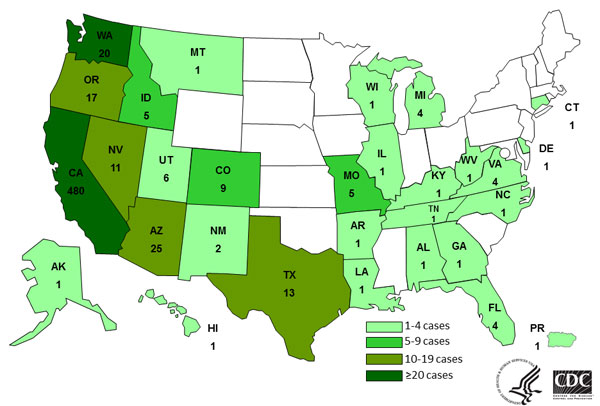Poor phase 2 results lead Biota to suspend flu drug laninamivir
The neuraminidase inhibitor laninamivir, made by Biota Pharmaceuticals Inc. of Alpharetta, Ga., failed to perform better than a placebo at alleviating influenza symptoms in a phase 2 trial, the company said in a press release today, adding that it will no longer develop the drug.
The trial, involving 639 patients, tested 40-milligram (mg) and 80-mg doses of the inhaled drug. The median time to alleviate flu symptoms was 102.3 hours and 103.2 hours for the two doses, respectively, compared with 104.1 for the placebo.
In April the US Department of Health and Human Services told Biota it was pulling out of its contract worth up to $231 million to support the drug's development. The company's partner, Daiichi Sankyo of Tokyo, has been marketing laninamivir in Japan since 2010 using the brand name Inavir.
"It is disappointing that the rapid and significant onset of antiviral activity against the influenza virus that the two treatment arms demonstrated with LANI [laninamivir] did not translate into a meaningful reduction in the time to alleviate patient-reported influenza symptoms," Biota President and CEO Russell H. Plumb said in the release.
"We expect to complete a full analysis of additional clinical, safety, and pharmacokinetic data forthcoming from this trial over the next several months; however, at this time we do not have any plans to independently advance the development of LANI for the treatment of influenza and intend to evaluate next steps for the LANI program outside of Japan with our partner, Daiichi Sankyo."
Aug 1 Biota Pharmaceuticals press release
North Dakota reports H3N2 variant flu in state fair pigs
North Dakota health and agriculture officials reported yesterday that three pigs that were exhibited at the North Dakota State Fair tested positive for an H3N2 variant influenza virus (H3N2v). In a statement. health officials said the pigs appeared healthy when they arrived at the fair, then became ill and removed by their owners.
North Dakota's state fair was held in Minot from Jul 18 through Jul 26. The North Dakota Department of Agriculture said no human H3N2v illnesses have been found and that the detection is the first at a fair in the state.
From 2011 through 2013, 340 human illnesses were reported in 13 states, but none were from North Dakota. Nationally, no human H3N2v cases have yet been reported this year.
Jul 31 North Dakota Department of Health statement
NYC conducts massive no-notice emergency response drill
The New York City Health Department today conducted the largest no-notice emergency response exercise in the city's history to test its ability to dispense drugs in the event of a biological agent release or other public health emergency, the department said in a press release.
The exercise involved more than 1,500 staff members from 13 agencies and entailed setting up 30 temporary locations for quickly mass-dispensing medication in the event of a true emergency. Most staffers had no advance warning, "to better test and simulate a real emergency and response," the release said.
"This is a full-scale exercise," the release read, "meaning the Health Department is physically executing multiple elements of our response plan. By conducting the exercise in this way, the Health Department can review each piece of our emergency response plan and learn of critical gaps that can be corrected with additional planning or changes in policy."
"This exercise demonstrates our commitment to ensuring we have the capability and resources to protect the health and safety of all New Yorkers in times of crisis," said Oxiris Barbot, MD, the city's first deputy commissioner.
Aug 1 NYC Health Department press release
Health Department FAQ on the exercise
Report: Resistant gonorrhea isolates less prevalent in Europe
The percentage of European gonococci isolates that showed decreased susceptibility to the main antibiotic used in Europe declined substantially from 2011 to 2012, the latest year for which data are available, according to a report today from the European Centre for Disease Prevention and Control (ECDC).
Of 1,927 Neisseria gonorrhoeae isolates collected in 2012 from 20 European nations, only 3.9% showed reduced susceptibility to cefixime, which was down from 7.6% in 2011 and 8.7% in 2010.
Also, 14 countries in 2012 detected isolates with reduced susceptibility to cefixime, down from 17 in 2011. The report noted these levels of resistant isolates for lesser-used antibiotics: ciprofloxacin, 50.1%; azithromycin, 4.5%; and penicillin G, 13.0%. The percentages for those three drugs did not differ much from the year before.
The ECDC also found that gonorrhea infections that were less susceptible to cefixime were more likely to be found in patients younger than 25 years compared with older patients, which represents a shift.
The ECDC concluded in a news release, "Control of gonorrhoea relies on effective antimicrobial treatment. If existing agents would become less efficient the impact would be significant: with more than 47,000 reported cases in 2012, gonorrhoea is the second most frequently recorded sexually transmitted infection in Europe after chlamydia."
Aug 1 ECDC report
Aug 1 ECDC news release













